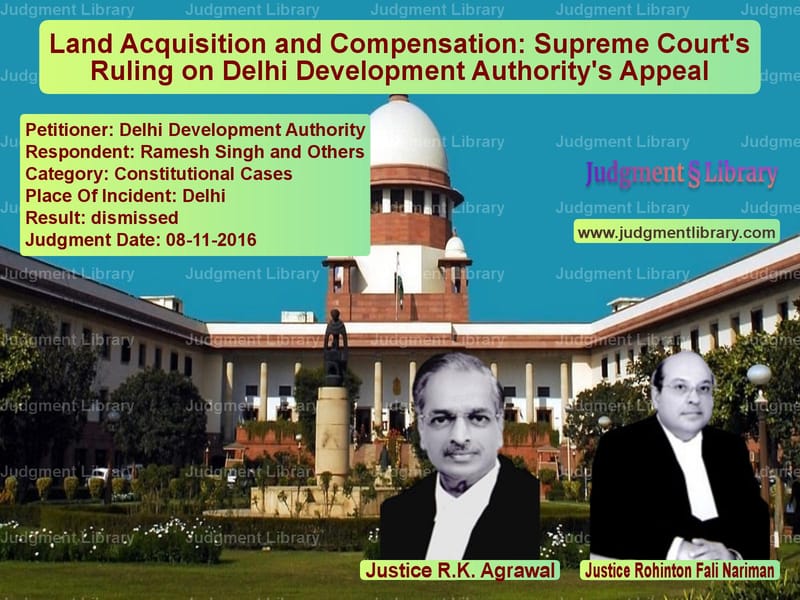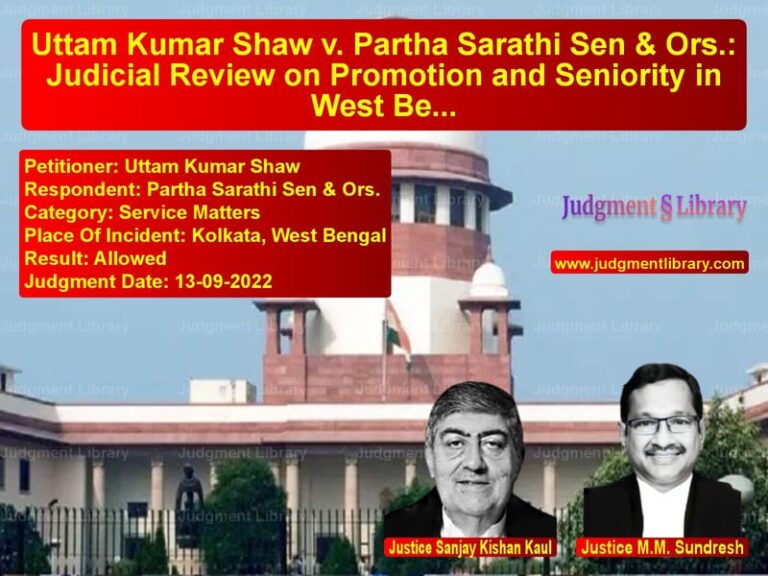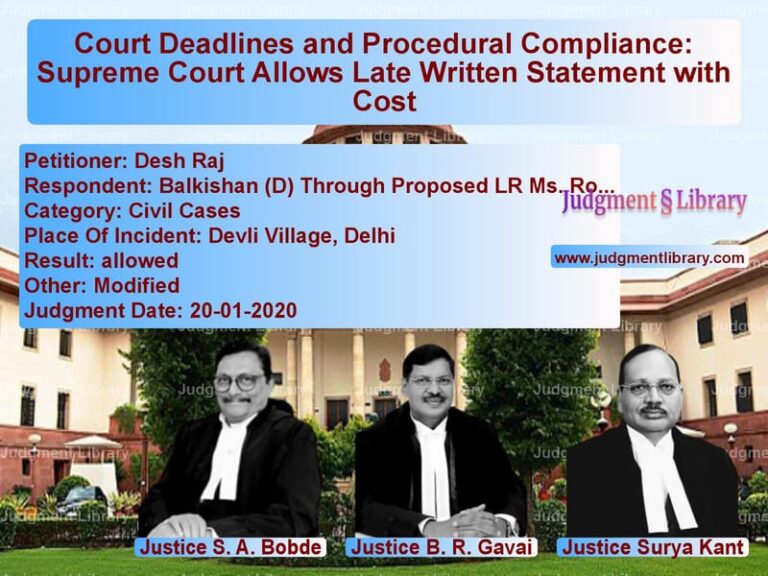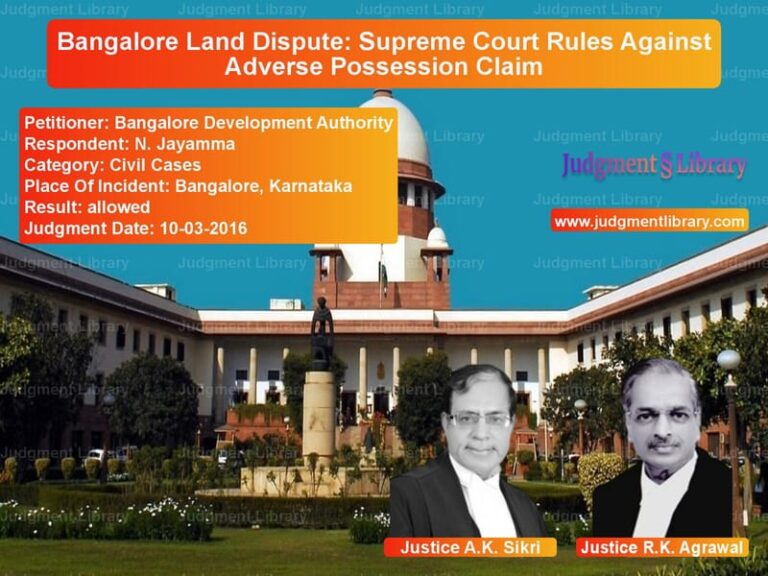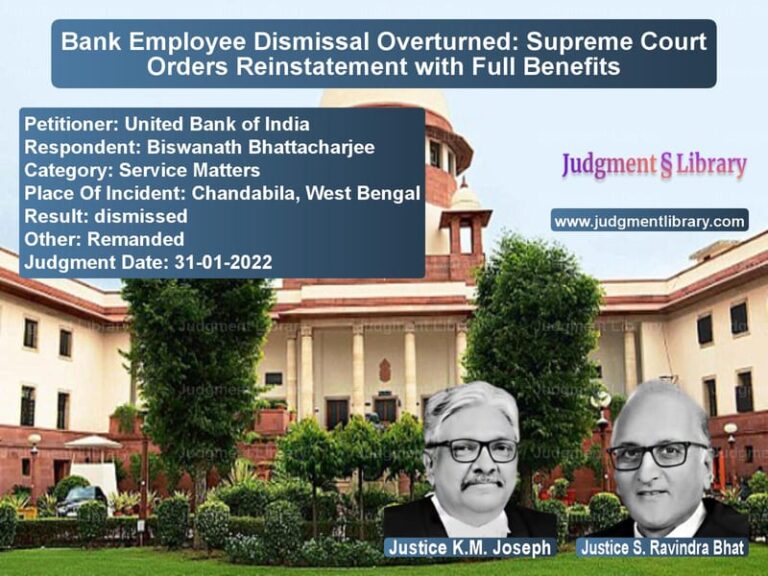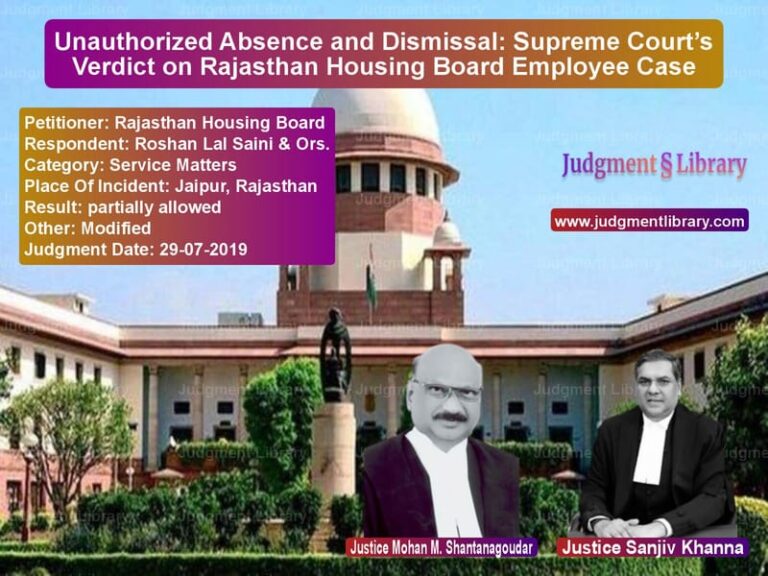Land Acquisition and Compensation: Supreme Court’s Ruling on Delhi Development Authority’s Appeal
The Supreme Court of India, in the case of Delhi Development Authority vs. Ramesh Singh & Others, addressed an important issue regarding the validity of land acquisition proceedings under the Right to Fair Compensation and Transparency in Land Acquisition, Rehabilitation and Resettlement Act, 2013 (Land Acquisition Act). The case revolved around whether the acquisition process could be revived after a significant delay, and the obligations of the acquiring authority to ensure the timely completion of the process.
The appellant, Delhi Development Authority (DDA), sought to exercise its powers under Section 24(2) of the Land Acquisition Act to initiate fresh proceedings after the original acquisition process was challenged. The case primarily dealt with whether such a course of action was permissible after a considerable delay and the legal consequences that followed.
Background of the Case
The dispute arose from the DDA’s attempt to acquire land for the development of a project in Delhi. The original acquisition proceedings were initiated, but delays in the compensation process led to challenges by the landowners. The respondents, landowners, argued that since compensation had not been paid within the statutory period, the acquisition proceedings were deemed to have lapsed under Section 24(2) of the Land Acquisition Act. In response, the DDA sought to revive the proceedings under the same provision, claiming the right to initiate fresh proceedings.
After a series of legal proceedings, the High Court dismissed the DDA’s request to revive the acquisition. The DDA then approached the Supreme Court, challenging the High Court’s decision.
Key Legal Issues
The Supreme Court examined the following questions:
- Whether the DDA was entitled to exercise its liberty under Section 24(2) of the Land Acquisition Act to initiate fresh acquisition proceedings after the delay in completing the original process.
- Whether the delay in completing the acquisition and paying compensation rendered the process invalid under the Act.
- Whether the respondents were entitled to the return of their land due to the lapsing of the acquisition process.
Petitioner’s Arguments
The Delhi Development Authority contended:
- The delay in the acquisition process was due to procedural reasons, and the land was still needed for the public purpose.
- Section 24(2) of the Land Acquisition Act grants the authority the option to initiate fresh proceedings if compensation is not paid within five years.
- It was crucial for the development of the city to acquire the land, and thus the acquisition process should be revived.
- The respondents had been given multiple opportunities to receive compensation, but they failed to comply with the procedures.
Respondent’s Arguments
The landowners, represented by Ramesh Singh and others, argued:
- The acquisition process had lapsed under Section 24(2) due to the delay in paying compensation.
- Once the acquisition process lapsed, the land should be returned to the original owners.
- Reviving the acquisition after such a delay would violate the legal protections provided to the landowners under the Land Acquisition Act.
- The respondents were entitled to the return of their land as the acquisition proceedings were deemed to have been invalid.
Supreme Court’s Observations
The Supreme Court carefully analyzed the provisions of Section 24(2) of the Land Acquisition Act, which states that if compensation is not paid within five years from the date of the award, the acquisition process is deemed to have lapsed. The Court made the following key observations:
1. Application of Section 24(2)
The Court reaffirmed the applicability of Section 24(2) and emphasized that the failure to pay compensation within the statutory period results in the automatic lapse of acquisition proceedings. It noted that this provision was designed to protect the interests of landowners and ensure timely compensation.
2. Revival of Acquisition Proceedings
The Court observed that while Section 24(2) provides a mechanism for the acquiring authority to initiate fresh proceedings, this must be done within the legal framework and within the time limits prescribed by the law. The Court found that the appellant had not acted within a reasonable time frame to initiate fresh proceedings.
3. Obligations of the Acquiring Authority
The Court highlighted that the acquiring authority must adhere to the principles of fairness, transparency, and timeliness in the land acquisition process. It noted that delays in compensation could not be justified by procedural reasons alone.
Final Judgment
The Supreme Court ruled in favor of the respondents, holding that:
- The acquisition proceedings had lapsed under Section 24(2) due to the failure to pay compensation within the prescribed time period.
- The DDA was not entitled to revive the acquisition process after such a significant delay.
- The respondents were entitled to the return of their land as the acquisition had lapsed under the provisions of the Land Acquisition Act.
Judgment Outcome: Appeal dismissed, acquisition proceedings lapsed, land to be returned to the respondents.
Don’t miss out on the full details! Download the complete judgment in PDF format below and gain valuable insights instantly!
Download Judgment: Delhi Development Au vs Ramesh Singh and Oth Supreme Court of India Judgment Dated 08-11-2016.pdf
Direct Downlaod Judgment: Direct downlaod this Judgment
See all petitions in Fundamental Rights
See all petitions in Separation of Powers
See all petitions in Public Interest Litigation
See all petitions in Judgment by R K Agrawal
See all petitions in Judgment by Rohinton Fali Nariman
See all petitions in dismissed
See all petitions in supreme court of India judgments November 2016
See all petitions in 2016 judgments
See all posts in Constitutional Cases Category
See all allowed petitions in Constitutional Cases Category
See all Dismissed petitions in Constitutional Cases Category
See all partially allowed petitions in Constitutional Cases Category

